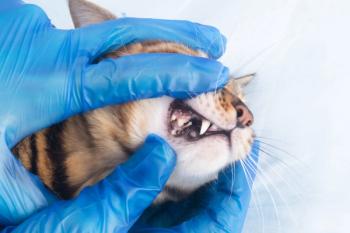
- dvm360 January 2019
- Volume 50
- Issue 1
AAFP releases consensus statement on feline feeding
Association aims to address the behavioral needs of cats and reduce stress-related eating problems in cats.
The American Association of Feline Practitioners (AAFP) has released a consensus statement about how to feed cats, along with a client-facing brochure, to the veterinary community, according to a release from the group. The consensus statement, called “Feline Feeding Programs: Addressing Behavorial Needs to Improve Feline Health and Wellbeing,” was published in the Journal of Feline Medicine and Surgery, and explores the medical, social and emotional problems that cats can experience as a result of the manner in which they are being fed. It focuses on how to feed cats, the release notes, because it is an overlooked aspect of feline health.
The statement identifies normal feeding behaviors, such as hunting and foraging and eating frequent, small meals in solitude, and provides strategies for accommodating these normal behaviors in the home-even if the home as more than one pet-the release says. Allowing for these behaviors regularly can help reduce or prevent stress-related issues such as cystitis or obesity-related problems such as inactivity and overeating. Anxious cats in multi-pet homes may also lose weight because, in an attempt to avoid other pets, they may not eat frequently enough.
“Currently, most pet cats are fed in one location ad libitum or receive one or two large and usually quite palatable meals daily. In addition, many indoor cats have little environmental stimulation, and eating can become an activity in and of itself,” says the consensus statement's chair, Tammy Sadek, DVM, DABVP (feline), in the release. “This type of feeding process does not address the behavioral needs of cats. Appropriate feeding programs need to be customized for each household and should incorporate the needs of all cats for play, predation and a location to eat and drink where they feel safe.”
The statement and client brochure help identify strategies that cat caregivers can use to provide a proper feeding environment that makes their cats happier and helps them avoid both overfeeding and underfeeding, the release states. The materials also emphasize the use of feeding programs, which should take into account whether or not the cat is indoor-only or has outdoor access, the other pets in the home, and if the cat is aged or has debilitations of some kind.
To read the consensus statement and client brochure, visit:
Articles in this issue
almost 7 years ago
New pet ownership data can help practices growalmost 7 years ago
Opioids and the veterinary teamalmost 7 years ago
Ticks may hold the key to treating tick-borne diseaseabout 7 years ago
Susan Cain addresses audience of introverts at Fetch dvm360about 7 years ago
And the 2018 Practice Manager of the Year isabout 7 years ago
New products from Purina and BI target stress in veterinary patientsabout 7 years ago
Read all about it! The top 10 veterinary news articles of 2018Newsletter
From exam room tips to practice management insights, get trusted veterinary news delivered straight to your inbox—subscribe to dvm360.




